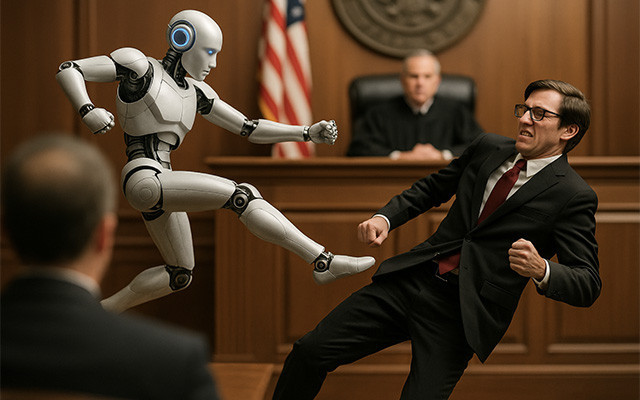
AI is replacing advocates — is there a real threat to the profession?

Artificial intelligence is entering courtrooms. For those who represent themselves, it has already become a benchmark in procedures and an assistant in forming legal positions. At the same time, for advocates, this is a new era in which AI provides preliminary analysis, searches for case law, and structures materials.
Journalists from NBC News investigated the issue of AI use in courts. They interviewed citizens, advocates, representatives of non-governmental organizations, developers of startups and companies working with legal databases, and shared several interesting stories.
Simplifying access to justice
For people who cannot afford to hire an advocate, artificial intelligence has become a real help in preparing for court. Journalists note that more and more citizens in the USA are using ChatGPT to draft procedural documents, analyze legislation, and build a legal position, foregoing the services of a professional advocate.
There are already successful examples. Journalists describe the story of a California resident who lost an eviction case that was handled by an advocate. But with the help of ChatGPT and the Perplexity system, she was able to prepare an appeal on her own, get the court order overturned, and avoid paying more than $70,000 in fines and overdue rent. She sent documents to artificial intelligence, receiving tips on possible procedural errors and the correct wording of arguments.
Another woman, a small business owner from New Mexico who owed a certain amount of money, used ChatGPT to check the logic of her arguments and refine them. Thanks to this, she managed to reach a favorable settlement agreement. Interestingly, after the trial, her opponents even praised her knowledge of law and court procedures, writing that if she was interested in law as a profession, she could easily do this job.
Such examples, according to journalists, show that even the basic version of ChatGPT or its commercial analogues open the way for many citizens to legal protection, which previously remained unattainable without the help of a professional lawyer. Thus, for such independent participants in the process, AI becomes a virtual assistant that creates a sense of equal opportunities with advocates.
At the same time, the experts surveyed emphasize that the successful use of ChatGPT does not eliminate the need for legal knowledge and does not replace qualified legal assistance. This is because most cases are too complex for AI to independently understand the context and provide a sufficiently high-quality analysis.
A challenge and a resource for advocates
AI is hardly a threat to professional lawyers. It also works as an assistant, but in a different capacity. This includes preliminary analysis, searching for case law, testing hypotheses before writing legal conclusions, and quickly structuring processed materials. With proper control and confidentiality, such tools can significantly increase the efficiency of an advocate's work.
However, as is well known, without human control, generative artificial intelligence systems are capable of producing unreliable data, fabricated quotes, and non-existent court decisions.
At the same time, incidents involving AI hallucinations do not only happen to ordinary citizens. Journalists cite an example in California where a lawyer was fined $10,000 for an appeal in which 21 of 23 quotes from court decisions were generated by ChatGPT.
The lawyers surveyed believe that such errors are the result of a lack of proper verification. They emphasize that AI can only help if the lawyer is able to recognize fabrications and analyze context.
Careless use of AI can be recognized by references to non-existent cases, «empty» template phrases left in the text, or even emojis and formatting that are completely inappropriate for procedural documents. Therefore, just as a law firm reviews the work of a junior lawyer, an advocate must review everything that artificial intelligence creates.
Lawyers, while sharply criticizing the careless use of AI in courts, do not oppose its use in general. On the contrary, many of them express cautious optimism about the introduction of such technologies into legal practice, provided they are used by specialists.
The full article «These people gave up on advocates and turned to ChatGPT in court» can be read in the original language at this link.
© 2025 Unba.org.ua Всі права захищені
"Національна Асоціація Адвокатів України". Передрук та інше використання матеріалів, що розміщені на даному веб-сайті дозволяється за умови посилання на джерело. Інтернет-видання та засоби масової інформації можуть використовувати матеріали сайту, розміщувати відео з офіційного веб-сайту Національної Асоціації Адвокатів України на власних веб-сторінках, за умови гіперпосилання на офіційний веб-сайт Національної Асоціації Адвокатів України. Заборонено передрук та використання матеріалів, у яких міститься посилання на інші інтернет-видання та засоби масової інформації. Матеріали позначені міткою "Реклама", публікуються на правах реклами.